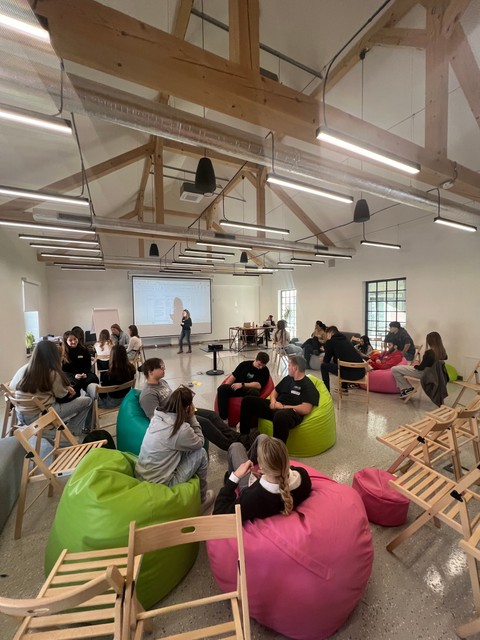
Who are the participants?
- How many? 167 students
- Where from? Nitra Region, Slovakia
- Age? 13–17 years old
- Selection? The City of Nitra helped distribute the workshop invitation through its local networks.
Can you tell us a bit about yourself and your organization?
Youthwatch contributes to societal change by incorporating the perspectives, needs, and values of young people. The organization promotes inclusive participation and brings new visions of shared futures into public discourse and policymaking.
Let's talk about the project. What's it called?
The project is called Message Towards the Region. It aims to support the City of Nitra and the Council of Youth of the Nitra Region in addressing the emerging needs of their younger population. The city of Nitra was looking to better understand and engage with its youth. Youthwatch proposed to apply futures literacy methodologies to spark meaningful conversations and foster co-creation between youth and decision-makers.
The intention was twofold:
- Pilot futures literacy approaches to see whether they could effectively engage young people in civic processes.
- Empower youth to imagine and express their visions of the future of their city and their lives.
Method
Youthwatch piloted a structured program centered on futures literacy, using participatory methods like world-building and role-play to encourage youth engagement.
The program explored two main themes:
- Futures of Leisure Time (2040): How youth imagine spending their free time in the future.
- Education: As Slovakia undergoes curriculum reform, youth were invited to imagine the future of schools and learning.
Over the course of the project, Youthwatch:
- Organized 7 workshops
- Facilitated round tables with elected officials
- Engaged both students and teachers
Leisure Cycle: Visions of leisure in 2040
Young people imagined:
- Spaces just for youth, accessible 24/7, without adult supervision.
- Self-managed spaces for gathering, sharing information, and socializing.
- Repurposing empty buildings, including a large unused one in Nitra:
- One example: the third floor transformed into a therapeutic space.
- Each floor had a distinct, youth-designed purpose based on their interests and emotional needs.
Education Cycle: Futures of learning
Amid ongoing education reform in Slovakia, workshops explored:
- Future curricula that integrate climate change, AI, migration, war, and pandemics.
- Emerging concerns about safety in schools, especially with the rise of school shootings in Slovakia and abroad.
- Mental health as a major concern, with youth expressing the need for future leisure to support emotional well-being.
Imaginative outcomes included:
- Unconditional income and automation in the workforce.
- Household AI robots with ethical oversight:
- Robots report to humans.
- A human-run ethics committee oversees robotic behavior (including police robots).
Youth scenarios often leaned dystopian, reflecting broader sociopolitical anxieties (e.g., war in Ukraine, social unrest). Although greenery and nature appeared in their visions (e.g., trees around schools), awareness of climate change was limited and mainly focused on recycling. Youth seemed more concerned with personal and emotional safety than environmental issues, which could become a future area of focus. Youthwatch asked participants about future involvement, but there is no clear follow-up mechanism. For many, it was their first time participating in a foresight process, and some even invited peers to join future workshops.
